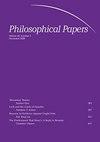分析与综合理解
IF 1.3
3区 哲学
0 PHILOSOPHY
引用次数: 2
摘要
在认识论上,理解是比解释更重要的概念。讨论了两种理解,一种是基于解释分析的理解,另一种是基于综合方法的理解。初级理解和次级理解之间的区别表明,谁在问为什么这个问题是至关重要的。这就引入了一个因果关系问题,它围绕着确定因果因素和区分原因及其载体所需的隔离程度。它表明,分析和综合的方法可以处理部分的理解,可以在没有解释的情况下增加理解,并且规律不是理解所必需的。本文章由计算机程序翻译,如有差异,请以英文原文为准。
Analytic versus Synthetic Understanding
It is argued that understanding is an epistemically more important concept than explanation. Two kinds of understanding are discussed, that based on analysis of the explanandum and a kind that is based on a synthetic method. The distinction between primary and secondary understanding shows that who is asking the why question is of central importance. A problem for causation is introduced that revolves around the degree of isolation that is needed to identify a causal factor and to distinguish causes from their carriers. It is shown that the analytic and synthetic approach can deal with partial understanding, that there can be an increase in understanding without an explanation, and that laws are not necessary for understanding.
求助全文
通过发布文献求助,成功后即可免费获取论文全文。
去求助
来源期刊

Philosophical Papers
PHILOSOPHY-
CiteScore
2.10
自引率
0.00%
发文量
18
期刊介绍:
Philosophical Papers is an international, generalist journal of philosophy edited in South Africa Original Articles: Articles appearing in regular issues are original, high-quality, and stand-alone, and are written for the general professional philosopher. Submissions are welcome in any area of philosophy and undergo a process of peer review based on initial editor screening and refereeing by (usually) two referees. Special Issues: Topic-based special issues are comprised of both invited and submitted papers selected by guest editors. Recent special issues have included ''Philosophy''s Therapeutic Potential'' (2014, editor Dylan Futter); ''Aging and the Elderly'' (2012, editors Tom Martin and Samantha Vice); ''The Problem of the Criterion'' (2011, editor Mark Nelson); ''Retributive Emotions'' (2010, editor Lucy Allais); ‘Rape and its Meaning/s’ (2009, editor Louise du Toit). Calls for papers for upcoming special issues can be found here. Ideas for future special issues are welcome.
 求助内容:
求助内容: 应助结果提醒方式:
应助结果提醒方式:


